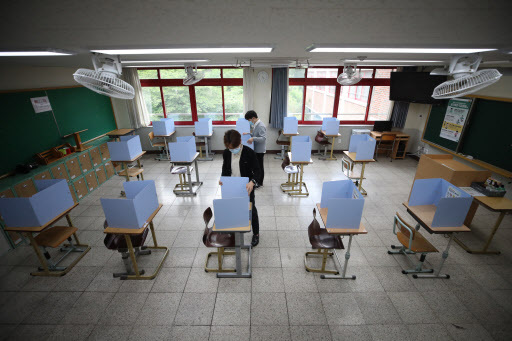
Amid lingering safety concerns over the novel coronavirus, third-year high school students will finally return to classrooms Wednesday, kicking off South Korea’s school normalization.
The high school seniors were chosen as the first group to return, as they face a hectic academic schedule until they sit for the country’s college entrance exam, which has been pushed back to Dec. 3.
“In the situation where we don’t know when the COVID-19 (pandemic) will end, we cannot indefinitely hold back education of some 450,000 high school seniors who face (important choices of whether to) pursue higher education or enter society,” Education Minister Yoo Eun-hae said Tuesday at a meeting with deputy heads of 17 regional education offices.
She stressed that the COVID-19 spread is sustained at a “controllable” level in the country and the government will do everything possible to ensure students’ safety.
Reopening of schools will take place in stages for the rest of students from next Wednesday through June 8.
While schools have been physically closed, students have been attending classes online since April 9.
“I feel like I just lost three months and feel anxious about the squeezed college admissions schedule,” said Jeong Hyun-seo, 18, who attends high school in Jeju Island.
“I am relieved that I am finally going back to school,” he said.
In Korea, one’s future -- from employment to marriage prospects -- is widely thought to have a stronger than usual link to which university they go to. This leads to notoriously fierce competition for places at top universities.
In their final year of high school, the students will need to prepare for the annual college entrance exam, take a few more school exams and prepare materials for college applications -- from personal statements to essays -- all at the same time.
This could give an advantage to those who prepare for college applications outside the school system, such as high school graduates seeking to retake the college entrance exam.
For students like Jeong, who do not receive much private education and rely on public schooling, the protracted school shutdown is a big disadvantage, he said.
“I could not concentrate on studying through online classes as much as I could through in-classroom learning,” Jeong said.
In the wake of the unprecedented remote learning, the quality of education has been tied to how prepared schools and teachers were in terms of their use of technology, and how available parents were to help their children follow classes.
Possibly further widening the educational divide, most private cram schools, called hagwon here, were still operating.
“I stay at home all day and then go to a hagwon every evening,” said Hong Hyuk-jae, 18, a high school senior in Seoul. “Honestly, I just turn the recorded videos (for online classes) on and instead study on my own or do hagwon assignments.”
Concerns, however, remain over the safety of students once schools reopen, given the possibility of mass infections in enclosed, packed classrooms.
A petition filed on the presidential office website asking that school reopening to be postponed had more than 230,000 signatures as of Tuesday afternoon.
To reduce the risks of infection, classrooms will change.
Central to the instructions provided by the Education Ministry and regional education offices are keeping physical distance among students and maintaining personal hygiene.
Classes will be held both online and offline.
When students physical attend schools, class sizes will be reduced, students from different grades will come to school every other day or every other week -- with schools given discretion to make choices depending on their circumstances. Classes with more than 30 students could be divided.
All students will be surveyed on their health -- whether they have a fever, respiratory symptoms and so on -- before attending school. They get fever checks twice a day while in school.
They should not go to school when they have respiratory symptoms or high fever.
Wearing a mask is mandatory at all times except during meals. Hand sanitizers, thermometers and face masks are being stocked in every classroom.
Transparent dividers are installed in cafeterias. Students from different grades and classes will have meals at different times
Under the ministry’s instructions, high school seniors have to go to school every day and those in other grades every other day or every other week.
Students in the second year of high school, third year of middle school and first two years of elementary school are to go back to school on May 27. In-person classes will resume for students in their first year at high school and second year at middle school and in the third and fourth years at elementary school on June 3. Schools will reopen for the rest on June 8.
Kindergartens will open on May 27.
Health authorities said they are “ready” for some confusion in the early stages as students go back to school.
High school seniors, educators and school employees will be given priority in coronavirus testing and get the result as quickly as possible, according to the authorities.
By Ock Hyun-ju (laeticia.ock@heraldcorp.com)
-
Articles by Ock Hyun-ju



















![[Today’s K-pop] Treasure to publish magazine for debut anniversary](http://res.heraldm.com/phpwas/restmb_idxmake.php?idx=642&simg=/content/image/2024/07/26/20240726050551_0.jpg&u=)